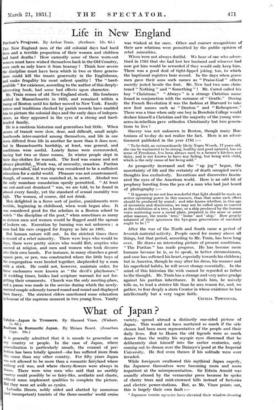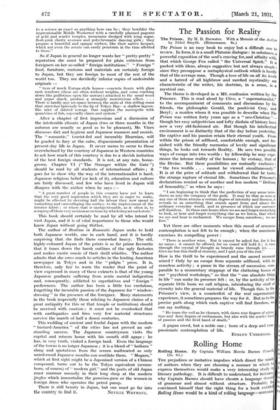What of Japan'?
1 ofuku—Japan in Trousers. By Sherard Vines. (Wishart. is. 6d.) IT is generally admitted that it is unsafe to generalize on any country or people. In the case of Japan, where generalization is particularly unsafe, the counsel of per- fection has been totally ignored—she has suffered -More-froth this cause than any other country. For fifty years Japan Was not allowed to be more than a romantic fairyland where nothing evil was, and where cherry-flowers were always in bloom. There were wise men- who said that no earthly rountry could possibly be so fairy-like, aesthetic and chaste, without some unpleasant qualities to complete the picture. But they were set aside as cynics.
Lafeadio Hearn, nobly aided and abetted by numerous (and incompetent) tourists of the three-months' world cruise
variety, spread • abroad a distinctly one-sided picture of Japan. This would not have mattered so much if the side chosen had been more representative of the people and their daily lives. But to Hearn the old legends were so much dearer than the reality his myopic eyes discerned- that he deliberately shut himself into the earlier centuries, only coming-out to dream over the Daimyo's7pond at the Imperial University. He -fled even thence if his solitude were ever invaded:
While foreigners swallowed this mythical Japan eagerly, the Japanese themselves were becoming more and more impatient at the misrepresentation. Sir Edwin Arnold was soundly abused by the vernacular press because he spoke of cherry trees and mist-crowned hills instead of factories and electric power-stations. But, as Mr. Vines points out, this is largely their own fault Japanese tourist agencies have elevated their window-dressing
to a science as exact as anything here can be - they bewilder the impressionable Middle Westerner with a carefully planned pageant of gold and scarlet temples, mountains dredged with icing sugar, flesh-pink cherry avenues and polychromatic dancing girls ; they prepare a beautiful and opaque surface, like their native lacquer, which not even the astute can easily penetrate in the time allotted to them."
So if Japan in general no longer wants her " pretty-pretty " reputation she must be prepared for plain criticism from foreigners on her so-called " foreign institutions." " Foreign " food, furniture, customs and materials are certainly foreign to Japan, but they are foreign to most of the rest of the world too. They are decidedly inferior copies of undesirable originals -
" tiers of mock Europe-style houses—concrete fronts with glass sash windows (these are often without weights, and come crashing down like guillotines upon the unwary) attached to the usual wood and paper shack, produce a strangely meretricious effect. . . . There is hardly any air-space between the units of this stifling mass that stretches hideously to the lip of Tokyo Bay—a shallow lagoon- like inlet of diluted sewage that supplies the metropolis with quantities of fish, especially clams and oysters."
After a chapter of first impressions and a discussion of the intolerable climate of Japan (two or three months in the autumn are usually so good as to be pleasant), Mr. Vines discusses diet and hygiene and Japanese manners and morals.
The " romantic," tourist-fed and incurably He,arnian, will be goaded to fury at the calm, dispassionate presentation of present-day life in Japan. It never seems to occur to those overwhelmed by the courtesy of Japanese in Western countries to ask how much of this courtesy is due to a slavish imitation of the best foreign standards. It is not, at any rate, home- grown. Chapter VI (" The Stranger within the Gate ") should be read by all students of international affairs ; it goes far to show why the way of the internationalist is hard. Japanese religious belief (or lack of it), education and culture are fairly discussed, and few who have lived in Japan will disagree with the author when he says :-
" A great number of people in this country have yet to learn that the very good impression which they are so eager to make, might be effected by devoting half the labour they now spend in varnishing and camouflaging the surface, to the improvement of the interior fabric ; or where that is unobjectionable, as it often is, to scraping off those very noxious accretions by which they set such store."
This book should certainly be read by all who intend to visit Japan, and it is of vital importance to those who would know Japan without going thither.
The author of Realism in Romantic Japan seeks to hold
both Japanese worlds, one in each hand, and it is hardly surprising that she finds them somewhat heavy. The old, highly-coloured Japan of the prints is so far prime favourite that it tones down the harsh outlines of the ugly factories and makes exotic music of their shrill whistles. The author admits that she owes much to articles in the leading American newspaper in Tokyo and in the " pidgin " press. It is, therefore, only fair to warn the reader that the point of view expressed in ninny of these extracts is that of the young Japanese graduate suffering from acute mental indigestion and, consequently, addicted to superlatives and " foreign " preferences. The author has been a little too credulous, forgetting the incurable passion of the Japanese for " window- dressing " in the presence of the foreigner. Many statements in the book (especially those relating. to Japanese claims of a great antiquity for this or that temple or institution) should be received with caution ; it must not be overlooked that with earthquakes and fires very few material structures survive the march of half a dozen centuries.
This wedding of ancient and feudal Japan with the modern " bastard-America " of the cities has not proved an out- standing success. The Japanese countryman visits the capital and returns home with his mouth still agape ; he has, in very truth, visited a foreign land. Even the language of the towns is no longer Japanese ; it is a blend of " haikara " slang and quotations from the screen maltreated as only uninformed Japanese mouths can mutilate them. " Mogaru," which at first sight might be a Japonized version of a Chinese compound, turns out to be the Tokyo equivalent (screen- born, of course) of " modern girl," and the poets of old Japan
must murmur uneasily in their long sleep at the modern jingles which immortalize the gasorinu-garu or the women in
foreign dress who operates the petrol pump. - There is still beauty in. Japan, but one must go far into



















































 Previous page
Previous page